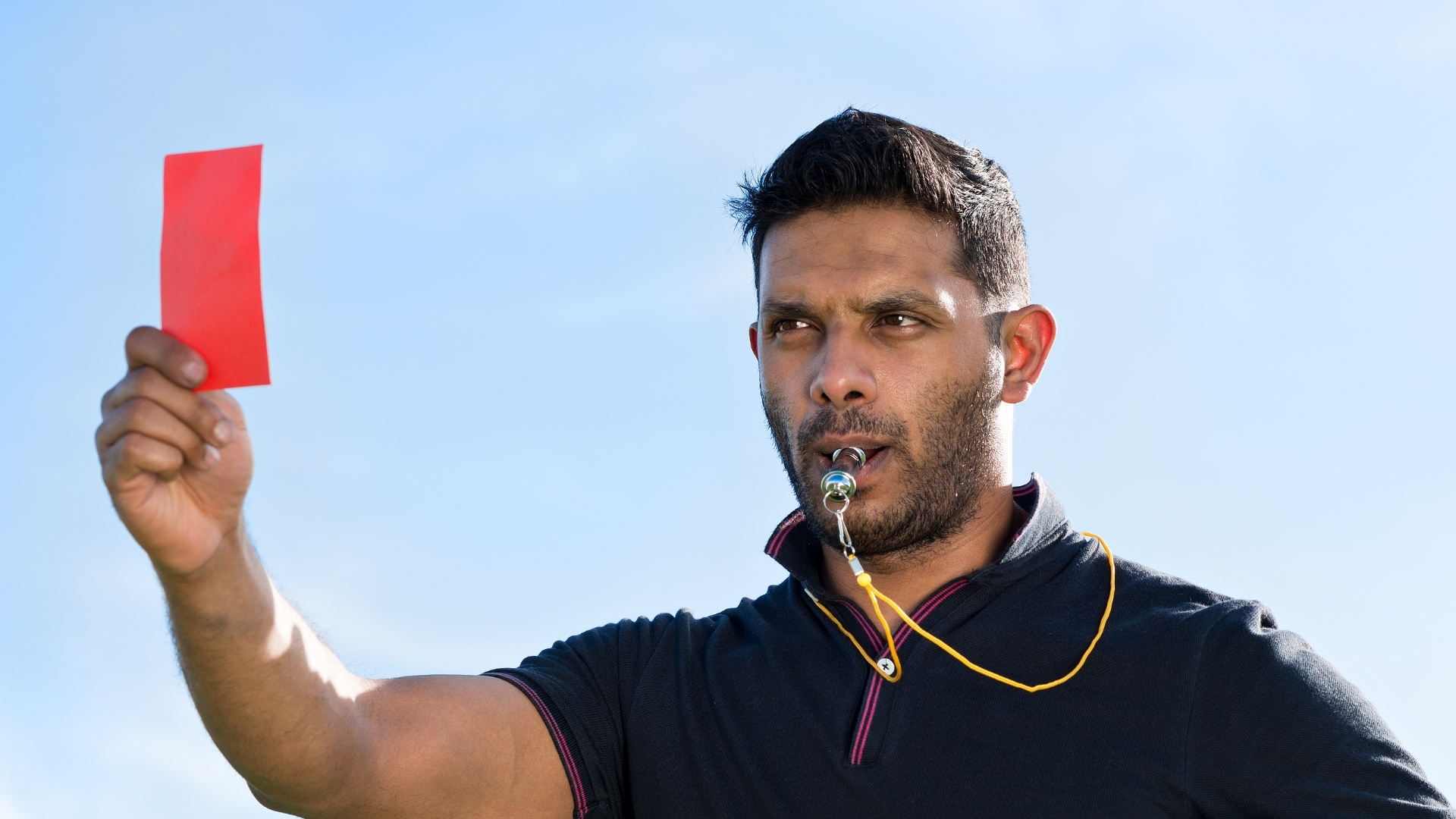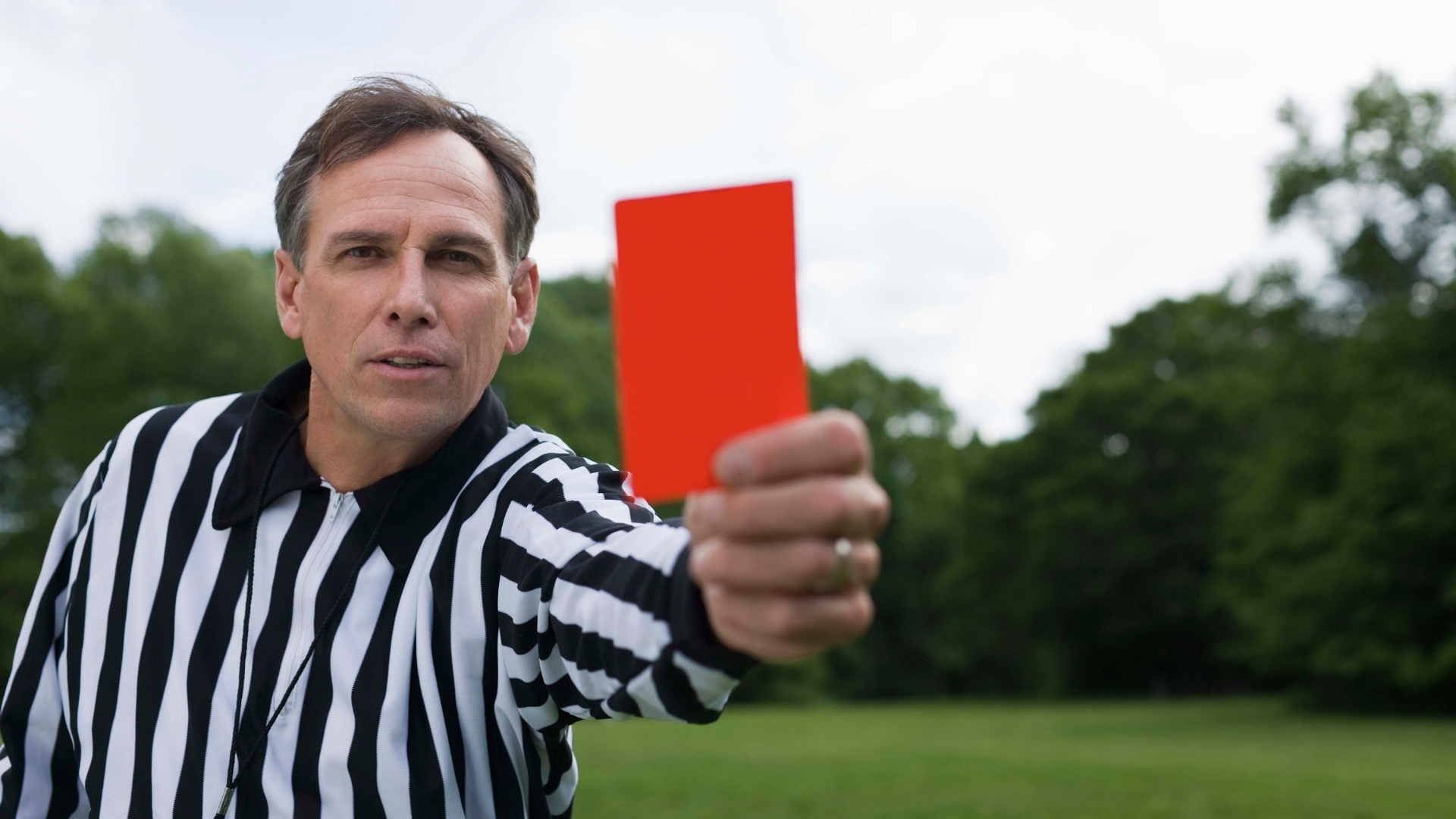There’s a reason why it’s a red card, with the color alone describing how severe of a penalty a player has conducted.
And in rugby, it’s much the same as it is only given to players who commit the worst of the violations in the game.
So what makes getting slapped with a red card a big deal?
What Is a Red Card in Rugby?

Like Death’s scythe, a red card takes the offending player out of the match in one swift call.
That’s for both rugby union and rugby league.
Getting handed with that dreaded card immediately signals a player being sent off.
No more explanations. Hit the showers. You’re done.
Why Would a Player Get a Red Card?
There are several reasons why a player might see red during a match:
- Serious foul play
- Dangerous tackles
- Repeated infringements
- Misconduct or unsportsmanlike behaviour
World Rugby has strict laws governing player conduct especially for those violators who merit a red card.
The Consequences of Seeing Red
Being penalised with a red card not only takes the player out of the pitch.
It also affects the team with the squad forced to play with a man down for the remainder of the match.
It could change the complexion of the whole game, all the more if you’re playing in high-stakes games like the Rugby World Cup or Six Nations Championship.
But the penalty doesn’t end after the final whistle.
Players at the receiving end of these red cards also face disciplinary summons and worse, suspensions depending on the severity of the offense.
The Referee’s Role in Issuing a Red Card
Issuing a red card is possibly the most significant verdict a referee can hand out.
Match officials must consider a lot of factors before pulling out that dreaded red card.
It includes on how severe the offense was and other considerations which should be accounted for in the decision.
The introduction of the Video Assistant Referee (VAR) in recent years has helped ensure that these calls will be made as accurate as possible.
The Impact on the Game and Team
It’s never easy to lose a player to a red card.
Playing handicapped is the last thing teams want especially in vital matches like that at the Rugby World Cup.
Not only are they playing undermanned, they also have to adapt on the fly with their gameplan.
Teams must quickly adjust their strategies, often sacrificing attacking options to shore up their defense.
But that’s just the tactical part of it.
A red card is a definitive punch to the gut, with the player’s ejection greatly affecting a team’s morale.
It forces them in a sink-or-swim situation, either they give up altogether or rally together in the face of adversity.
Other Cards in Rugby: Yellow and Sin Bin
As severe as the red card is, not all cards in rugby result in an automatic disqualification.
Yellow cards serve as a warning for the players, telling them to cool down as they stay in the “sin bin” for the next 10 minutes.
It’s a chance for the players to reflect on his actions, or else face ejection.
It’s like giving a player a time out, all while the rest of his team continue to fight on.
Notable Red Card Incidents in Rugby History
Over the years, red cards have had their place in history altering results in the history books.
These incidents, from controversial tackles to shocking acts of misconduct, affect the outcomes of crucial matches.
It’s also a chance for players to remember the utmost importance of discipline and sportsmanship in rugby.
The Citing Process: When the Referee Misses It

Sometimes, an offense worthy of a red card might be missed during the game.
Not all referees are perfect to make these calls. That’s why there’s a citing commissioner who reviews match footage and cite players for foul play that was left uncalled on the field.
This ensures that serious offenses don’t slip through the cracks, even if they’re missed in real-time.
Red Cards in Major Tournaments
In high-profile events like the Rugby World Cup, a red card can have massive implications.
A player could miss crucial knockout games or even a final because he was booked.
On the flipside, referees also face immense pressure to make the right calls as their whistles can very well shape who wins and who loses in a tournament.
The Evolution of Red Card Rules
Times have changed, and so does rugby’s laws around red cards.
World Rugby continuously reviews and updates these rules, with among the most recent focused on stricter punishments for high tackles as it prioritises player safety and maintain the sport’s integrity.
Red Cards and Player Safety
The main reason for the red card is to protect players.
Rugby is as physical of a sport as they come, and sometimes, it can also become dangerous without strict enforcement of the rules.
The threat of being booked also encourage players to tackle safely and play within the laws of the game.
Controversial Red Card Decisions
Like any subjective decision in sports, red cards can be controversial.
There have been instances where booking decisions have been debated, especially when specific parties feel that a red card isn’t justified.
These discussions often lead to further clarification of the rules and improved referee training.
The Role of Technology in Red Card Decisions
Technology also has an important role in deciding on when to book a player with a red card.
Referees now review incidents in slow motion through the Television Match Official (TMO) before making a final decision.
These innovations have helped in reducing errors for the officials, but on the flipside, has caused longer lulls in play.
Red Cards in Rugby Union vs. Rugby League

While both disciplines use red cards, there are still some significant differences on how they’re applied.
Rugby league tends to see fewer red cards partly due to differences in the tackle laws and the lesser physicality of the game.
The Psychological Impact of Red Cards
It’s never easy to be on the receiving end of a red card.
It can affect their confidence and potentially change their playing style.
Teams and coaches often work with sports psychologists to help players recover from the mental toll of a red card incident.
Conclusion: The Importance of Discipline in Rugby
The red card system in rugby underscores the importance of discipline in the sport.
It’s a reminder to the players that as physical as the game of rugby is, they also have a duty to play fairly and safely.
Remember, as the great referee Nigel Owens often says, “This is not soccer!” Rugby prides itself on respect and discipline, and the red card system plays a vital role in upholding these values.